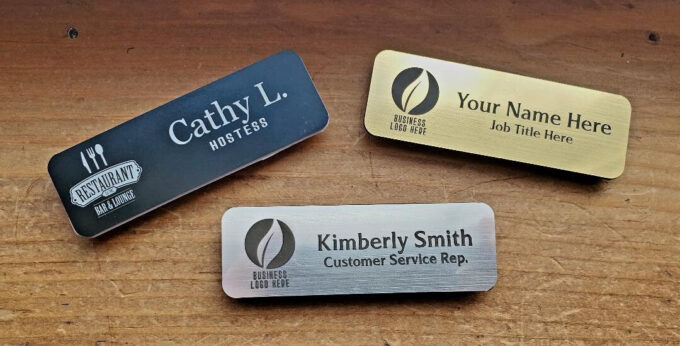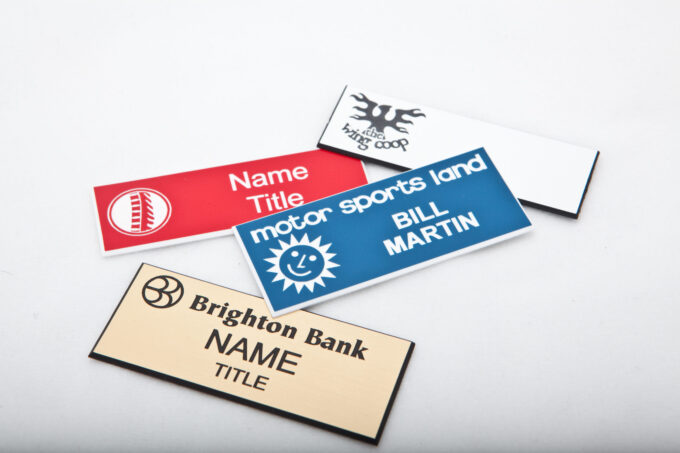In the realm of branding, identity plays a pivotal role. It’s not just about logos, colors, or catchy slogans; it’s about the people behind the brand. One of the most overlooked yet impactful tools in branding is the employee name tag.
These aren’t just pieces of plastic or metal with a name on them; they’re powerful branding instruments that can significantly enhance marketing efforts.
The Power of Identity in Branding

Identity is the essence of any brand. It’s what sets one company apart from another. It’s the unique characteristics, values, and attributes that a brand embodies.
When employees wear name tags, they become living embodiments of the brand. This not only fosters a sense of pride among employees but also creates a more personal connection with customers.
Fun Fact: Did you know that customers are more likely to trust and engage with employees who wear name tags? It’s a simple yet effective way to break down barriers and initiate conversations.
Employee Name Tags
While the primary purpose is to identify an individual, its potential goes way beyond that. With the rise of creative name tags, businesses can now incorporate their branding elements, such as logos, colors, and even slogans, into the design.
Pro Tip: When designing a name tag, ensure it aligns with your brand’s visual identity for maximum impact.
The Psychological Impact

Creating a Sense of Belonging
For employees, wearing a name tag can instill a sense of belonging and pride. It signifies that they are part of a larger community, representing a brand and its values. This can boost morale and motivation, leading to increased productivity and job satisfaction.
Fostering Personal Connections
Name tags humanize interactions. When customers see an employee’s name, it creates a personal connection, making interactions more genuine and authentic. It’s easier to strike up a conversation with “Sarah from Marketing” than an anonymous staff member.
Building Trust and Approachability
Trust is a cornerstone of any successful business relationship. Name tags can play a significant role in building this trust. When employees are easily identifiable, it fosters a sense of transparency and openness, making them more approachable.
Enhance your marketing strategy by considering how employee name tags can intersect with branding and the essential investments small businesses should prioritize, as discussed in our article.
Subtle Brand Ambassadors
Instant Recognition and Recall
A well-designed name tag can make a lasting impression. When customers repeatedly see the same branding elements, it reinforces brand recognition, leading to better recall in the future.
Aligning with Brand Values
Name tags can be customized to reflect a brand’s values. For instance, a company that prides itself on sustainability might use eco-friendly materials. This not only sends a strong message to customers but also reinforces the brand’s commitment to its values among employees.
Amplifying Brand Visibility
Every time an employee steps out wearing their name tag, they’re essentially a walking advertisement for the brand. This can significantly amplify brand visibility, especially in events, conferences, or even everyday scenarios like a coffee run.
Discover how employee name tags can play a pivotal role in enhancing branding and marketing, while also exploring the impact of strategic recruitment on business profitability in our related article.
Personalization in Marketing

Tailored Customer Interactions
Personalized interactions can make customers feel valued and appreciated. When an employee addresses a customer by their name, it can lead to more meaningful and tailored interactions, enhancing the overall customer experience.
Humanizing the Brand Experience
In an age of digital interactions, the human touch is becoming increasingly valuable. Name tags add a personal touch to the brand experience, reminding customers that behind every brand, there’s a team of dedicated individuals.
Facilitating Lasting Impressions
First impressions matter, and a well-designed name tag can make all the difference. It not only conveys professionalism but also showcases the brand’s attention to detail, leaving a lasting impression on customers.
Cultivating Professionalism and Unity
Encouraging Accountability
When employees wear name tags, they’re more likely to take responsibility for their actions, knowing that they’re easily identifiable. This can lead to better customer service and increased accountability.
Reinforcing a Cohesive Team Culture
Name tags can foster a sense of unity among team members. When everyone wears one, it creates a level playing field, reinforcing the idea that everyone, regardless of their position, is part of the same team.
Strengthening Internal Brand Alignment
Name tags can serve as constant reminders of the brand’s values and mission. This can help in aligning employees with the brand’s objectives, ensuring that everyone is on the same page.
Discover how employee name tags can contribute to enhancing your company’s image and branding efforts, while also exploring 11 valuable branding tips in our dedicated article.
Designing Effective Employee Name Tags

Incorporating Brand Elements
Effective name tags seamlessly blend individual identity with brand identity. By incorporating brand elements such as logos, color schemes, and fonts, businesses can ensure that their name tags serve as subtle yet powerful brand ambassadors.
Fun Fact: A consistent color scheme can increase brand recognition by up to 80%.
Balancing Aesthetics and Legibility
While it’s tempting to go all out with design, it’s crucial to strike a balance between aesthetics and legibility. A name tag should be visually appealing, but its primary function is to identify. Ensure that names and designations are readable, even from a distance.
Utilizing Quality Materials
The materials used speak volumes about a brand’s commitment to quality. Using durable, high-quality materials not only ensures longevity but also conveys a sense of professionalism.
Pro Tip: Opt for materials that are resistant to wear and tear, especially if employees are in roles that require frequent movement or outdoor activities.
Measuring the Impact
Tracking Customer Feedback and Perception
One of the most direct ways to measure the impact is through customer feedback. By conducting surveys or gathering informal feedback, businesses can gauge how name tags influence customer perceptions and interactions.
Analyzing Employee-Customer Interactions
With the advent of CRM systems and analytics tools, businesses can track and analyze interactions between employees and customers. This data can provide insights into how name tags influence sales, customer satisfaction, and overall engagement.
Quantifying Increase in Brand Awareness
While it’s challenging to directly attribute brand awareness to name tags, businesses can look at indirect metrics. For instance, an increase in customer inquiries, social media mentions, or even word-of-mouth referrals can indicate heightened brand awareness.
Case Studies

Hospitality Industry
In the hospitality industry, personal connections are paramount. Hotels and resorts that have integrated custom name tags report enhanced guest experiences, with many guests recalling staff names, leading to repeat visits and positive reviews.
Retail Sector
Retail giants have long recognized the power of name tags. By humanizing the shopping experience, retailers have seen increased shopper loyalty, higher sales, and more positive in-store interactions.
Corporate World
In the B2B sector, where deals are often large and relationships matter, name tags can make a significant difference. Businesses report that their use in conferences and meetings fosters a sense of trust and openness, paving the way for successful collaborations.
Overcoming Challenges and Concerns
Addressing Employee Privacy Concerns
While name tags are beneficial, it’s essential to address privacy concerns. Some employees might be uncomfortable displaying their full names. In such cases, using first names or initials can be a viable solution.
Dealing with Consistency
For businesses with a large workforce or multiple branches, ensuring name tag consistency can be challenging. Regular audits, centralized procurement, and clear guidelines can help maintain consistency.
Managing Employee Resistance
Change is often met with resistance. When introducing name tags, some employees might be hesitant. It’s crucial to communicate the benefits, provide options, and gather feedback to ensure smooth adoption.
Discover how employee name tags can contribute to enhancing your company’s image and branding efforts, while also exploring 11 valuable branding tips in this article.
Best Practices for Implementing in Marketing

Collaborative Decision-Making
Involving employees in the decision-making process can lead to better adoption and more effective designs. By gathering feedback and ideas, businesses can ensure that their name tags resonate with both employees and customers.
Providing Guidelines and Training
Once name tags are introduced, it’s essential to provide clear guidelines on how to wear and maintain them. Regular training sessions can also help employees understand the significance and best practices associated with their name tags.
Iterative Refinement Based on Feedback
Like any other marketing tool, name tags should be subject to regular refinement. By gathering feedback and making iterative changes, businesses can ensure that they remain effective and relevant.
Incorporate employee name tags as a tactical element in your marketing endeavors, while also exploring effective small-business marketing strategies in this article.
Conclusion
Elevating branding isn’t just about big-budget campaigns or flashy advertisements. Sometimes, the most profound impacts come from the simplest tools.
Employee name tags, when designed and implemented effectively, can serve as powerful brand ambassadors, humanizing the brand and fostering genuine connections. In the ever-evolving world of marketing, perhaps it’s time to embrace the subtle power of the name tag.









